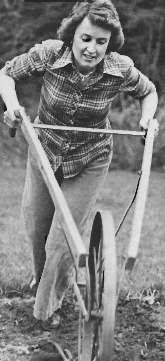Articles/Essays – Volume 14, No. 4
Honor Thy Mother
Is it the product of a single mind or a conspiracy? I wonder as I slide into the waxed church pew. I have been force-fed a breakfast of eggs scrambled with Cool Whip (they thought it was sour cream) and am now seated in Church to witness by far and above the most sadistic ritual of the day—the Mother’s Day program, wherein our husbands, daughters and sons (under duress) are paraded before us and forced to recite party-line propaganda on motherhood.
God deliver me.
I can’t help thinking of my own children’s reaction to Mother’s Day. My twelve-year-old is flabbergasted at the mere suggestion that he take some of his own hard-earned money to buy me a present. My ten-year-old sees no use in it but thinks a children’s day would be fine. My seven-year-old is willing, but unfortunately, I explain tactfully, the picture he brought back to me from the junkyard does not fit our new, modern decor. (Don’t knock it, my husband had cautioned, out of all the boys, he is the only one who thought of you while we were at the dump.)
Wonderful.
“Mid pleasures and palaces,” the program begins as the congregation flounders from passage to passage of the sentimental hymn unsung since last year at this time. “There’s no place like home,” we sing with an audible sigh of relief at the end of the chorus.
I wish I were there.
Now we are honored with a long and pious opening prayer extolling the virtues of motherhood as if the Lord Himself needed to be reminded. The “amen” is followed by a sanctimonious welcome to “all those who have seen fit to come this day to pay tribute to that noblest of God’s creations, the mother.”
Help.
Next we are subjected to an assortment of talks with titles like “What My Mother Means to Me by a Teenager,” while all the time you know the little devil would rather tell you how my mother is mean to me. He sits down and holds out his hand to his father who, without so much as blinking an eye, returns the hostage car keys. Two different speakers address the subject of “What I Remember Most about Mother,” but the conclusion is the same: God rest her soul.
Yes. She worked herself to death.
Finally some young, enthusiastic mother of six months gives up her one day off a year to tell us all about “The Joys of Motherhood.”
Give her two years.
I have often suggested some alternate titles such as “Everything You Never Wanted to Know about Motherhood and Still Don’t,” or “Mothers: Love Them or Leave Them Alone,” but so far my helpfulness has reaped only icy stares from the bishop.
Three or four ill-prepared songs have been interspersed with the talks for special effect but have served only to make me feel more uncomfortable and unworthy. Sometimes I go to bed hoarse from yelling at my children all day. Sometimes I hide in the closet and pretend I’m not at home. Sometimes I even threaten to run away if they don’t stop being mean to me.
Nothing to sing about.
So far the program has moved forward in the usual manner, the obligatory number of tears and sniffles having been shed and sniffed. The day of expiration nearly complete, the service culminates in the presentation of awards.
The fertility count.
“Will the oldest mother here please stand?” the bishop asks. He might add “what’s left of her,” or “if she can.” A sweet young thing of thirteen, tresses flying, dashes importantly down the aisle with a small potted plant.
“Will the mother with the most children please stand?” A few anxious moments tick away while rivals are quickly cross-examined as to exact number of children, living or dead, miscarriages not counting. Sister Smith is eliminated—she must sit down; but, Jones and Lewis hang tough. Two winners, two plants.
I hope this doesn’t run short the supply.
“Will the youngest mother please stand?” A frowsy-looking teenager with an illegitimate baby looks furtively about for a few seconds and then leaps boldly to her feet. A horrified hush falls like a pall over the festivities. After an excessive number of throat-clearings, the bishop apologetically explains that he means to say, “The mother with the youngest baby.” The teenager stubbornly remains standing, and after whispered consultations behind printed programs, it is agreed that she wins on either count.
Winners in other categories such as “the mother who has come the greatest distance,” “the mother who has been a widow the longest,” “the mother with the longest arms,” continue to receive their awards. At last the rungs of honor descend to the lowliest of the low—the common, ordinary, garden-variety mother, who seems to be neither old nor young, rich nor poor, fat nor slim, happy nor sad.
Nothing.
A sweet young thing hands me a plant. I look at its scraggly leaves and calculate its life span in my home.
Two weeks.
As an afterthought, the young children of the Junior Sunday School are marched to the front of the chapel to sing their tribute to mother. The expectant little faces search the congregation anxiously and then break into joyful smiles, sometimes even audible “Hi, Mom’s.” A three-year-old on the front row pulls her dress over her head and sticks her finger in her bellybutton; two feisty little boys engage in hand-to-hand combat while never missing a note of the song; a superior eight-year-old, arms folded Indian-style, adds a note of dignity to the general squirming.
Suddenly I realize that all these years I’ve been deluding myself. Mother’s Day isn’t for mothers. It’s for children—very young children. They are the only ones with enough innocence to honor a mother; they are the only ones with enough love to appreciate her.
I laugh. Children! Where would mothers be without them?


 Back to full Issue
Back to full Issue

